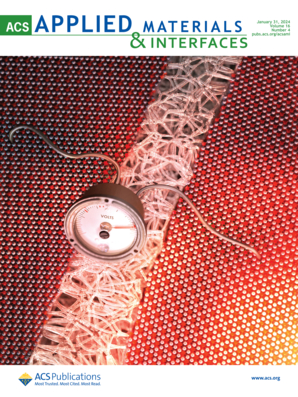可调单细胞多态纳米力学表型通过微移液辅助原子力显微镜解剖细胞异质性
IF 8.3
2区 材料科学
Q1 MATERIALS SCIENCE, MULTIDISCIPLINARY
引用次数: 0
摘要
机械力对细胞功能和疾病至关重要,特别是基于原子力显微镜(AFM)的力谱已成为表征单细胞力学特性的标准和重要平台。在这里,我们提出了一项研究微移液辅助AFM,使活细胞在其生物过程中的多态纳米力学表型。微移液辅助AFM提供了额外的能力来操纵单个活细胞在三维,允许利用AFM为基础的力谱分析,以构建动态纳米力学表型的单细胞在多个状态。通过微移液管操作,单个活细胞可以选择性地原位分离,并随后定位在具有可控特性的工程基质上的特定位置。随后,由于细胞与微环境的相互作用而改变的生理状态下,同一细胞的力学变化可以通过AFM来测量。该方法的有效性在多种系统中得到了验证,包括单细胞对ECM生化信号的反应,单细胞对ECM物理信号的反应,以及在物理限制下参与细胞间相互作用的单细胞力学,揭示了个体细胞的许多独特行为和纳米力学表型。该研究展示了一种实验方法来构建单细胞在受调节的生理和病理变化的机械图谱,这为从生物力学角度解剖细胞异质性提供了额外的可能性,并将有利于机械生物学。本文章由计算机程序翻译,如有差异,请以英文原文为准。
Tunable Single-Cell Multistate Nanomechanical Phenotyping by Micropipette-Assisted Atomic Force Microscopy to Dissect Cellular Heterogeneity
Mechanical forces are crucial for cellular function and disease, and particularly, atomic force microscopy (AFM)-based force spectroscopy has become a standard and important platform for characterizing the mechanical properties of single cells. Here, we present a study of micropipette-assisted AFM that enables multistate nanomechanical phenotyping of a living cell during its biological processes. Micropipette-assisted AFM offers the additional capability to manipulate single living cells in three dimensions, allowing the utilization of an AFM-based force spectroscopy assay to construct the dynamic nanomechanical phenotypes of single cells at multiple states. With micropipette manipulations, individual living cells could be selectively isolated in situ and subsequently positioned at specific locations on the engineered substrates with controllable properties. Subsequently, the mechanical changes of the same cells in the changed physiological states due to the interactions between cells and their altered microenvironments could be measured by AFM. The effectiveness of the proposed method was verified in a variety of systems, including single-cell responses to ECM biochemical cues, single-cell responses to ECM physical cues, and single-cell mechanics involved in cell–cell interactions within physical confinement, revealing numerous distinctive behaviors and nanomechanical phenotypes of individual cells. The study demonstrates an experimental approach to build the mechanical atlas of single cells undergoing regulated physiological and pathological changes, which offers additional possibilities for dissecting cellular heterogeneity from the biomechanical perspective and will benefit mechanobiology.
求助全文
通过发布文献求助,成功后即可免费获取论文全文。
去求助
来源期刊

ACS Applied Materials & Interfaces
工程技术-材料科学:综合
CiteScore
16.00
自引率
6.30%
发文量
4978
审稿时长
1.8 months
期刊介绍:
ACS Applied Materials & Interfaces is a leading interdisciplinary journal that brings together chemists, engineers, physicists, and biologists to explore the development and utilization of newly-discovered materials and interfacial processes for specific applications. Our journal has experienced remarkable growth since its establishment in 2009, both in terms of the number of articles published and the impact of the research showcased. We are proud to foster a truly global community, with the majority of published articles originating from outside the United States, reflecting the rapid growth of applied research worldwide.
 求助内容:
求助内容: 应助结果提醒方式:
应助结果提醒方式:


